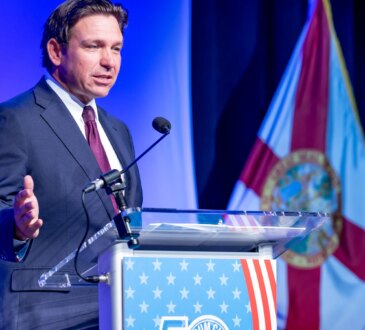May 17—GRAND FORKS — Kelly Armstrong entered his first term as governor hoping to foster meaningful change during the 2025 session of the Legislature.
That was accomplished, the first-term governor believes, with the passage of sweeping property tax reform and a ban on cellphones in schools. He pushed the former for months, including during the campaign leading up to the November election that put him in office, while the latter was a late-session decision, but important nonetheless, he said.
Armstrong, a native of Dickinson, served in the Legislature from 2013 to 2018 before a successful run for U.S. House in 2018. He won reelection in 2020 and 2022 before deciding to run for governor after Gov. Doug Burgum announced he wouldn’t seek a third term.
After defeating Merrill Piepkorn in the November election — earning 68% of the vote — Armstrong took office in mid-December, roughly three weeks before the start of the legislative session. On Jan. 7, he gave his first State of the State address.
That quick turn was aided by Burgum’s generosity, he said, as well as the help from Joe Morrissette, director of the Office of Management and Budget.
“I couldn’t have done it without (Morrissette),” Armstrong said during a Thursday visit with the Grand Forks Herald. “Governor Burgum was very generous. … We couldn’t have done it without him being gracious with allowing us access to the cabinet heads, allowing us that stuff.”
Burgum, before leaving office, already had charted a proposed budgetary course, which means the new administration was “standing on the shoulders of giants, so to speak,” Armstrong said.
“We changed some things in Gov. Burgum’s budget but we didn’t get rid of the State Hospital or the women’s correctional facility. The things that we did differently that were unique to us were property tax and cellphones. Those were ours that we moved through.”
During his State of the State speech, Armstrong set the tone for the property tax initiative.
“We are not the biggest state. We don’t claim to be. We don’t want to be. But the people of North Dakota have big hearts and big ideas, and we have always had the courage to try new things,” he said. “Summoning that courage is essential if we are going to solve some of our most pressing issues — first and foremost, property taxes.”
In the final days of the session, on May 2, the Legislature passed House Bill 1176, expanding the primary tax credit to a maximum $1,600 — more than tripping the previous credit of $500 — and capping local-level tax increases to no more than 3% annually.
“The governor provided a lot of leadership with this,” Sen. Mark Weber, R-Casselton, told the Bismarck Tribune upon 1176’s passage. “And if he had not been on board, we would not have gotten this done.”
As the property tax issue dominated headlines even before the start of the session, a rather unexpected victory pleased Armstrong as the session concluded. And while property tax relief comes with a price tag of roughly $408 million (to be paid with Legacy Fund earnings), the governor points out that his other pet project — the cellphone ban in schools, from opening bell to closing bell — doesn’t cost a thing.
“No money involved in that,” he said of the phone ban. “It’s probably the one issue that my former legislative experience was really beneficial on. There was a lot of undercurrent of real momentum for it — you just had to recognize it. One of the reasons is the data tells you all of this: more anxious, more mental health (issues), bullying, lack of objective reasoning, lack of concentration. But I think it’s also the same thing anecdotally, that anyone with teenagers can see. … I think it will have a tremendous impact and the easiest way I can explain it is that you ask any school that has done it, and none of them regret it.”
He credits Lt. Gov. Michelle Strinden for providing important assistance, utilizing her background in education. Originally, Armstrong figured the cellphone proposal would be an interim issue, but as the session progressed, it seemed the time was right. Somebody just had to “pull the Band-Aid off,” he said.
“We were always going to do it, but then about halfway through. … There was like a light bulb going on in the Governor’s Office. We were like ‘why are we waiting to do this? It doesn’t cost any money. Teachers want it and parents want it.’ Being a teacher is hard enough without being a phone cop.”
Property tax reform and the cellphone bill allowed him to leave his own imprint on his first legislative session as governor, he said.
“The K-12 budget is great, (work within the Department of Health and Human Services) is great, the State Hospital is great. But those were all in Gov. Burgum’s budgets,” Armstrong said. “The property tax thing, we worked with a lot of legislators on it. … But this came from us. And the cellphone thing came because I don’t know if anybody else had, I don’t know if political courage is the right phrase, but I know that 10% of parents in every school district are going to be mad about this. I also know we’re trying to do the most good for the most students. If we had stopped and thought about that for three weeks, we would have never gotten it done.”
Rep. Mark Sanford, R-Grand Forks, commended Armstrong for the governor’s accomplishments so far.
“Gov. Armstrong demonstrated real leadership throughout his first session in office,” Sanford said. “Kudos to him.”
The Grand Forks Herald’s Delaney Otto contributed to this report.



